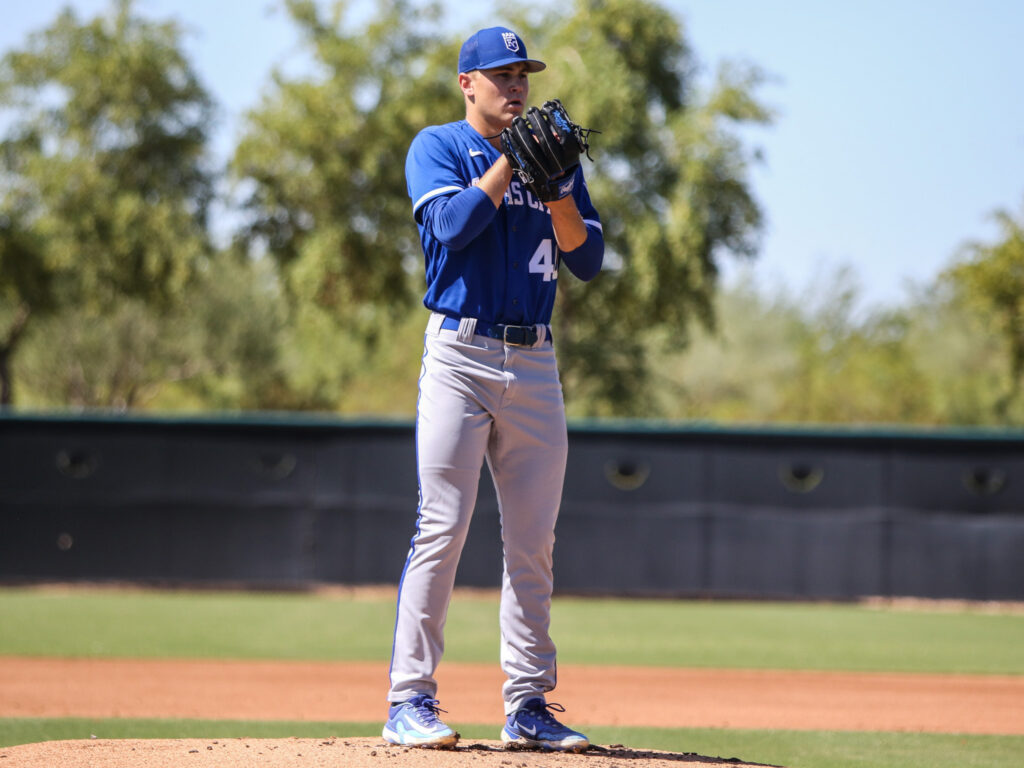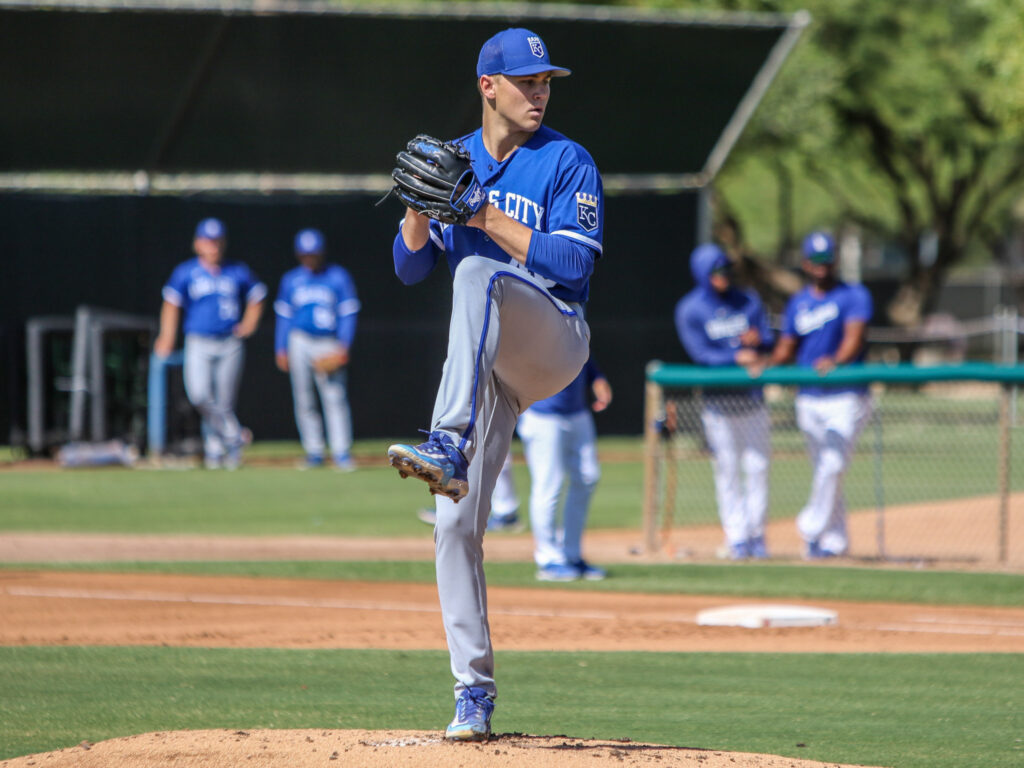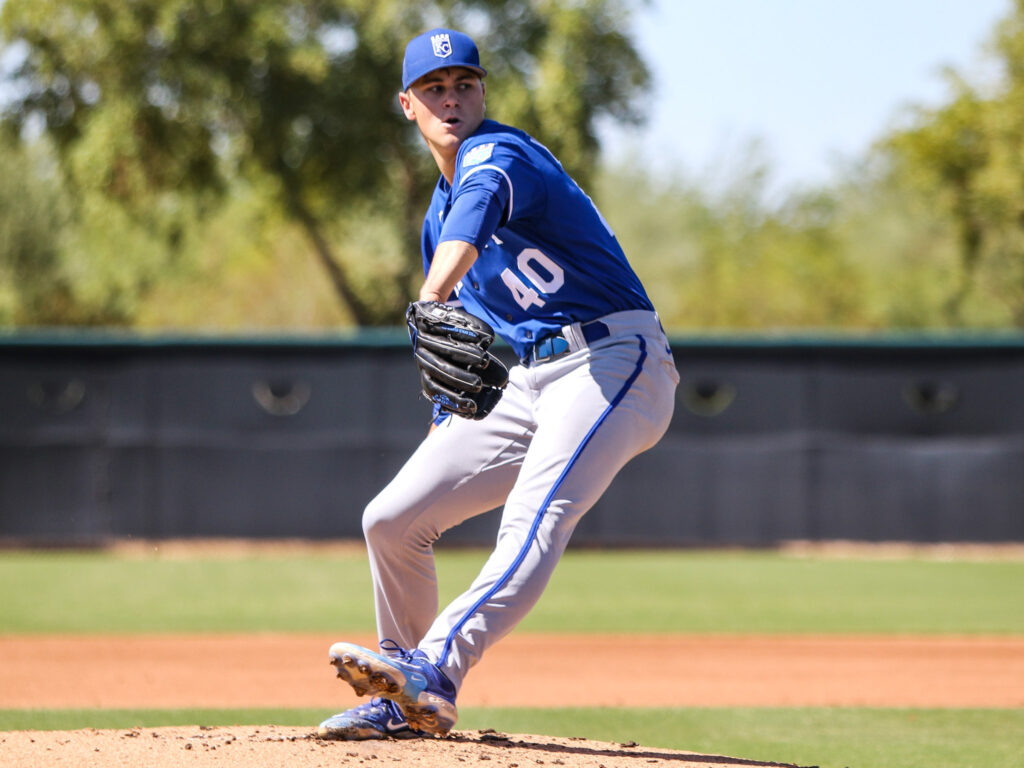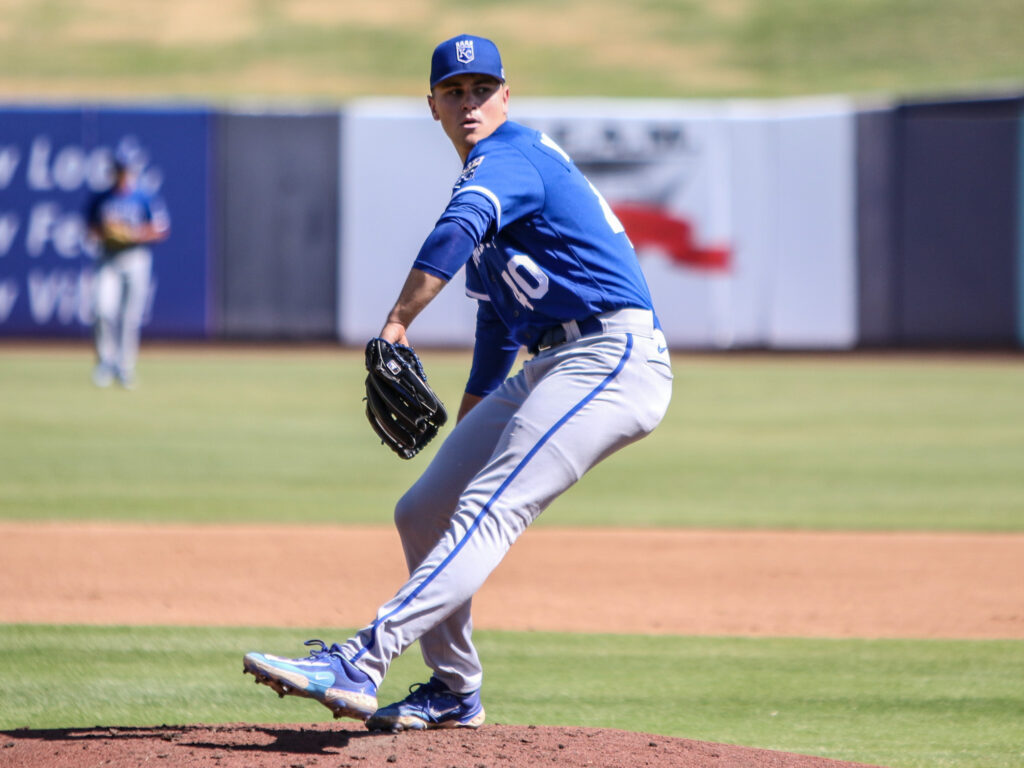By FRED KRONER
The Kansas City Royals’ organization – headed by Paul Gibson, the Senior Director of Pitching Performance – has a master plan for the young (high school-aged baseball players) that it drafts each year.
The idea is not to see how quickly they can have the talented prospects wearing a major league uniform.
The thought instead is to have them prepared to contribute once they arrive on the major league scene.
For some – those not familiar with the process – it might seem counterproductive to draft a high school pitcher in the second round with the 44th overall pick, then sign him for a reported $2.8 million and then limit that individual to a total of two innings pitched before the season ended.
That is, however, exactly what the personnel associated with the Kansas City Royals and under Gibson’s direction had in mind for former Mahomet-Seymour athlete Blake Wolters, who in fact was the 44th player chosen in the July baseball draft.
The Royals’ organization is looking for a long-term benefit from its investment, not a short-term burst.
Few people know and fully embrace that philosophy better than Nate Adcock, who was among the coaches that worked with Wolters throughout the summer and fall during his time in Surprise, Ariz., at the Royals’ spring training complex.
Now 35, Adcock was in Wolters’ situation in 2006.
“I was drafted out of high school by Seattle in the fifth round,” Adcock recalled. “I had hardly ever been out of western Kentucky.”
Transitioning to a game played by adults, who are intent on making their living in that manner, and immediately adjusting to time away from home is unlike taking a Spring Break vacation for a week.
Just days after being under their parental supervision, these teen-agers are asked to look after themselves, take care of their own laundry, get up early for daily team meetings or workouts, and handle the other responsibilities that come with being on their own.
“It’s life-changing,” Adcock said. “Kids have to learn to take care of themselves like I did when I was 18.
“Blake was very mature and handled it with grace.”
The emphasis for these rookie pitchers is on training, conditioning and working on their skills.
Since the COVID-19 draft year of 2020, more major league clubs have embraced the attitude of taking it slow with their teen-aged pitchers.
The annual major league draft was traditionally a staple in early June. Depending how a high school fared, the draft could be held within a matter of days after the season ended with their athletes in peak condition and ready to quickly return to action.
For the past three years – every draft conducted since the start of COVID – the draft was moved to July to coincide with All-Star week and after the conclusion of the College World Series.
For Wolters, the later draft date meant that from the time he threw his last pitch for the Mahomet-Seymour Bulldogs on May 27, 2023, it was nearly two months before he was in Arizona, signing his first contract (on July 18) and getting ready to move into the state-of-the-art dorm-type facility that the Royals use.
Thus, Wolters wasn’t assigned to one of Kansas City’s minor league affiliates and asked to – literally – pitch in immediately.
“With the high school season ending early, to build back up, we felt was not the wisest decision,” Adcock said. “Moving across the country, we felt it was more important for him to get comfortable, get his feet wet and get acclimated with his teammates.
“We wanted to be cautious about building him up. We wanted to take it slow and see what he was about.
“The most important thing is to keep him healthy. You can’t develop if you’re not healthy. We didn’t want to risk anything. There was no rush. People will see it pay off in the years to come.”
The current philosophy is not one which was always embraced in the past. In the past 56 years, three high school pitchers have gone directly to the major leagues after the draft without first spending time in the minors. All got their starts in the 1970s.
None of the three wound up their careers with a winning record at the professional level and one (David Clyde) was out of the game by age 24. Another (Tim Conroy) was finished playing by age 27.
The third (Mike Morgan) played until he was 42 and spent parts of 24 seasons in the majors.
Since the 1960s, approximately one dozen other pitchers (either out of high school or college) made their major league debuts as teen-agers, but first had at least a brief stint in the minor leagues.
Wolters, a hard-throwing 6-foot-4, 210-pounder, wasn’t idle during his nearly three months in Arizona.
“We worked out every day (except Sundays),” Wolters said, “and got used to pro-ball life, whether it was throwing bullpens, lifting or conditioning, and working our way up to going into games.
“They’ve been taking it really slow, which is understandable. They kept the high school guys at the (training) complex. They didn’t rush anything.”
Adcock – who also serves as a scout for the Royals – was part of the vast contingent that watched Wolters pitch in person for the Bulldogs during his senior year. Adcock was impressed by the approach that Wolters took when left on his own in Arizona.
“He’ll cut a joke once in a while, but he takes his work very seriously,” Adcock said. “When he has a baseball in his hands, he’s all business.”
Wolters was one of approximately 50 prospects at the Surprise training facility for the majority of the summer. When the minor league season ended, about two dozen other players came back to participate in the Arizona Instructional Fall League.
The Royals designated Wolters as the starting pitcher in two games, held five days apart. Each time, it was pre-determined that he would be restricted to one inning.
The right-hander – who recently turned 19 – made his professional debut on Saturday, Sept. 30, at Glendale, Ariz., against a team of rookies affiliated with the Los Angeles Dodgers.
“It was exciting,” Wolters said, “but I was a little nervous for the first one.”
The first batter he officially faced as a professional reached base on a broken-bat, slow-rolling infield single. Wolters walked the second hitter, but settled down to hold the Dodgers scoreless, retiring the next three hitters – the heart of the batting order – on infield ground balls or a popup to first base.
“You could see the nerves were there,” Adcock said, “but he executed nicely.”
A Twitter post by TheJerryEspinoza that day reported that two of the outs were on “weak ground balls.”
Wolters’ had a perfect inning on Thursday (Oct. 5) at Phoenix against a team of rookies affiliated with the Milwaukee Brewers.
He struck out the side, fanning the first and third hitters on 3-2 pitches and the second batter on a 2-2 offering. The last two batters – both of whom were playing in college during the spring – went down swinging.
Matt Wood, from Penn State, was a fourth-round draft choice by the Brewers. He was followed in the lineup by Milwaukee’s first-round pick (the 18th overall selection), Brock Wilken, who played for a 54-win Wake Forest team that played in the College World Series and signed a contract for a reported $3.15 million with the Brewers.
“Blake was much more confident in his second outing,” Adcock said. “We were encouraged by his two innings pitched. His last inning was a very good finish to the Instructional League.”
In both starts, Wolters was throwing to Blake Mitchell, a catcher from Sinton, Texas, who was a recent high school graduate and was the Royals’ first-round draft choice (and the No. 8 pick overall) in the July amateur draft. Wolters and Mitchell were also roommates during the summer.
Wolters’ parents, Doug and Angie, were in Arizona and got to see his professional debut. Angie was also in the stands for her son’s second start.
Though his innings on the mound were limited, Wolters has no regrets about not accepting a scholarship offer to play baseball at the University of Arizona.
“I definitely made the decision that was best for me, and I am happy with it,” he said. “I feel good about it.
“It was exciting to get a little taste of it. It went really well.”




Wolters will attend a Royals team camp in Arizona in mid-January and then report back to the state for Spring Training in February.
“The goal is to make it to the low (Class) A team in Columbia (S.C.),” he said.
“That’s not out of the question,” Adcock said. “We want him to move up.”
The pace, the intensity and the demands on Wolters will be greater when Spring Training arrives.
“He’ll be used to what (baseball) life is like,” Adcock said.
Unlike at M-S, when Wolters served as both a pitcher and a hitter, he is only focused on throwing now with the Royals.
“I’m glad I’m spending all of my time on pitching,” he said. “Hitting is really different, especially once pitchers get to this level.
“I was drafted as a pitcher, and they don’t want me swinging.”
Throughout the summer and fall, the players’ time was structured, starting with breakfast at the team’s training facility and ending with lunch at the complex.
“If there was no (afternoon) game, we had the rest of the day off,” said Wolters, who often rested, but occasionally played golf, went hiking or did some sightseeing.
That was the one unexpected part of his summer journey.
“I had more free time than I thought I’d have,” he said. “I haven’t gotten into the grind of a long season.
“We’ll see what that’s like next year.”
As he builds his arm up this winter offseason for a 2024 season that could last up to six months, Wolters believes his first season in professional ball was a success.
“I saw what it takes, to show up every day, I have more knowledge about the game and pitching,” he said, “and my change is a lot better
“I have to get better every day and keep doing what I’m doing.”
While training during the summer with Adcock, former Cy Young award winner Mark Davis (who had 44 saves for the Padres in 1989) and Justin Friedman, Wolters said the focus was on “being the best pitcher possible,” adding, “they didn’t change much (mechanically), but worked on my slider and fast ball.”
Adcock – who pitched in 56 games during a four-year major league stint – said Wolters had a good grasp on the fundamentals when he was drafted.
“We knew about his athleticism, and he has good size, strength and body control,” Adcock said. “He has a good delivery, effortless velocity and a good, above average, slider.
“He is developing his change. We like his competitiveness. A lot of things check out for him.”
Wolters said that he and his summer teammates got along well rather than viewing each other as threats to their own advancement.
“It was not too difficult to make friends,” he said. “You spend almost all of your time with them. We’re supportive of each other.
“There’s competition (for spots), but most of us don’t think about it.”
Since returning to his parents’ Mahomet home in mid-October, Wolters has continued to work out regularly and train at the YardGoats facility in Champaign.
He also finished two online classes offered through Glendale (Ariz.) Community College earlier this month. He took a speech class and an American music history class.
Last weekend, he and several other athletes affiliated with professional baseball (Hayden Birdsong, Jack Payton and Cam Robinson), put on a 4-hour, one-day camp at the Yard Goats facility on N. McKinley Ave., in Champaign.
There were about 80 area youth, of various ages, in attendance.
“I had helped with ones in Mahomet in the past, but I took more ownership in this one and it was fun,” Wolters said.
He has another event to look forward to in the New Year before departing for Spring Training, and it will be at his alma mater.
Wolters has scheduled an Autograph Session to benefit the Mahomet-Seymour Booster Club. It will be held in the M-S high school commons area on Sunday (Jan. 14) from 2-4 p.m.
There will be items available that day to purchase and have signed or people can bring their own items and have them signed with a donation.
As for his signing bonus, Wolters hasn’t made any luxurious purchases.
“Just saving it all right now,” he said.



